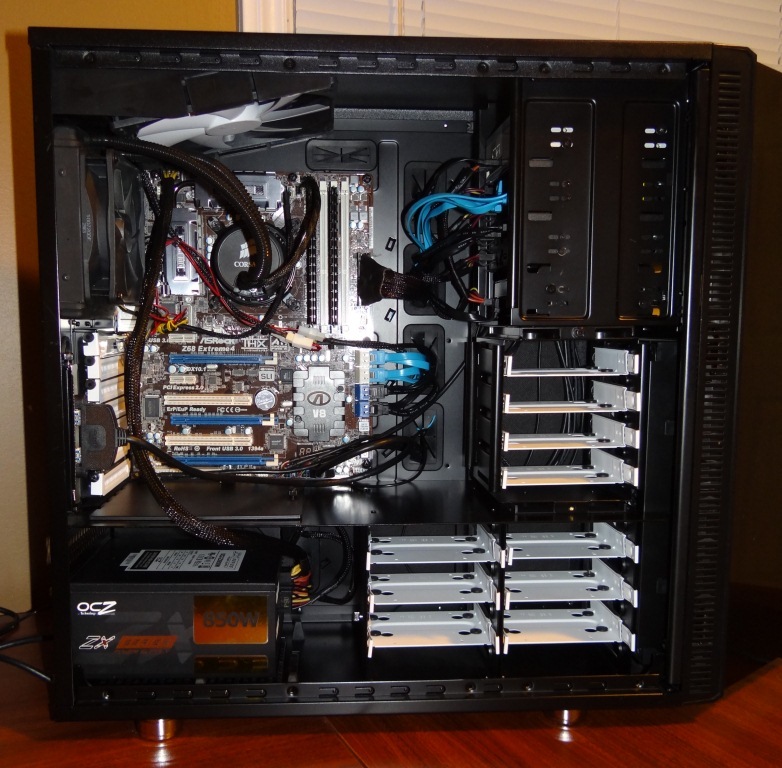 Although we are putting the final touches on our new and upgraded System Test Benches, we felt this picture would be of benefit.
Although we are putting the final touches on our new and upgraded System Test Benches, we felt this picture would be of benefit.
A simple click will enlarge it to assist.
Our main goal in testing is to ensure that all test results are as accurate as they can be and no anomalies slip through.
We conduct all tests three times and, if necessary, we may conduct specific tests in Windows 7 safe mode to ensure the OS has little to no influence on the end result.
We prefer to use several industry supported benchmark programs in order to provide validation and confirmation of results. We also prefer to provide the reader with the actual tests as received to avoid any confusion when unexpected test benchmarks are received.
 We would like to thank OCZ, Corsair, ASRock, Crucial and Fractal-Design for sponsoring components of our Test Bench.
We would like to thank OCZ, Corsair, ASRock, Crucial and Fractal-Design for sponsoring components of our Test Bench.
SSD COMPRESSION AND TESTING FLUCTUATIONS
All SSDs are not created equal and many new SSD enthusiasts realize that when they test their new drive to confirm specifications and ensure all is in order. SandForce controlled SSDs, as in the Sandisk Ultra 240GB SSD we are testing today, use compression techniques in storage whereas many others do not. This creates a bit of confusion when enthusiasts test the drive with random data through benchmarking programs such as AS SSD and Crystal Diskmark (random data sample). The results seem to be lower than the listed specifications.
The results actually present a false portrayal of the drives ability when compared to other drives such as the Samsung 470 Series and Crucial M4 SSDs that we have reviewed previously. It is for this reason that all of our comparison testing is done through PCMark Vantage. PCMark Vantage HDD Suite simply provides evaluation results based on transfer speeds reached through typical user patterns. Vantage provides a better testing medium, in that, it sees through the typical synthetic benchmarks and provides us with true to life results of the drive.
BENCHMARK SOFTWARE
Software used for testing by The SSD Review consists of Crystal DiskMark, ATTO Benchmark, Anvil Storage Utilities along with FutureMark PCMark Vantage.
All do a great job of showing us the numbers that we want to see, or dont want to see in some cases, while PCMark Vantage x64 is an excellent program which recreates tests that mimic the average users activity, all the while providing a medium to measure each.
ATTO DISK BENCHMARK VER. 2.46
ATTO Disk Benchmark is perhaps one of the oldest benchmarks going and is definitely the main staple for manufacturer performance specifications. ATTO uses RAW or compressible data and, for our benchmarks, we use a set length of 256mb and test both the read and write performance of various transfer sizes ranging from 0.5 to 8192kb. Manufacturers prefer this method of testing as it deals with raw (compressible) data rather than random (includes incompressible data) which, although more realistic, results in lower performance results.
 At 282MB/s read and 272MB/s write, the ATTO Disk Benchmark results were dead on the money which was great to see.
At 282MB/s read and 272MB/s write, the ATTO Disk Benchmark results were dead on the money which was great to see.
CRYSTAL DISK BENCHMARK VER. 3.0 X64
Crystal Disk Benchmark is used to measure read and write performance through sampling of raw (0/1 Fill/compressible) or random data which is, for the most part, incompressible. Many new SSD owners who cant wait to test the performance of their SSD often grab this program and run a quick test, not realizing that they are testing with incompressible data rather than compressible data used in testing by manufacturers. The following results will show RAW data (oFill) on the left with random on the right.
Crystal DiskMark returned similar results and also gave us the chance to understand how the Ultra works a bit slower with incompressible data through its random data sample. Incompressible data is best represented by media such as video, music and pictures and the result on the right demonstrates how moving large amounts of incompressible files is slower. The play of media, however, remains unchanged and this only represents the aspect of transferring those files.
INDEX
TEST PROTOCOL AND INITIAL TESTING
ANVIL PRO AND PCMARK VANTAGE PERFORMANCE
 The SSD Review The Worlds Dedicated SSD Education and Review Resource |
The SSD Review The Worlds Dedicated SSD Education and Review Resource | 